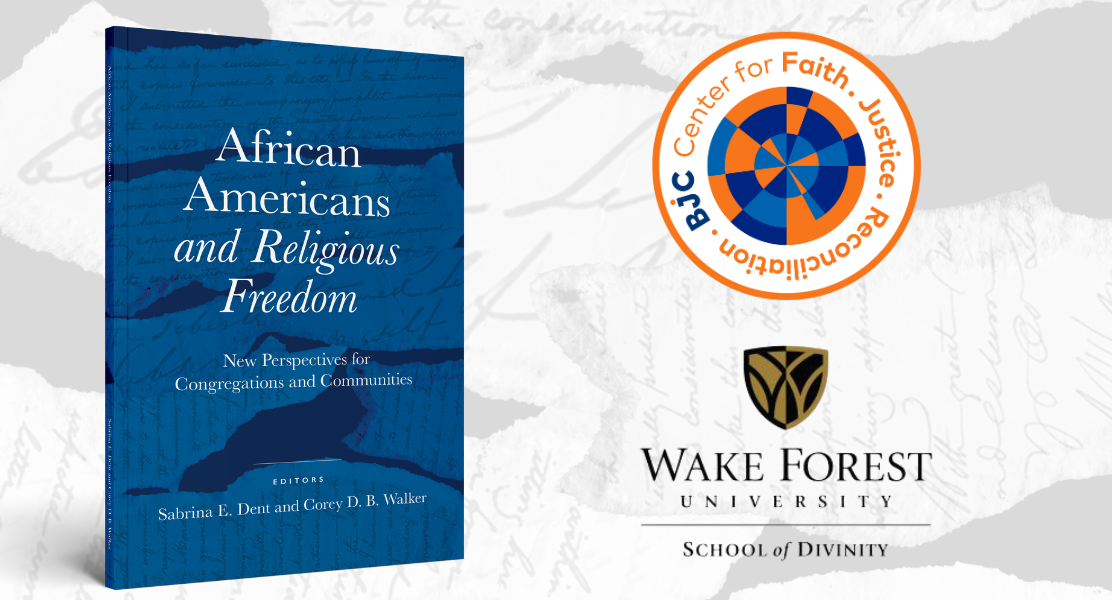Free resource reframes religious freedom through African American culture, history, ideas and religious experiences
First released days before the attack on the U.S. Capitol in January 2021, the second edition includes a new preface addressing the need for religious freedom to undergo a deep interrogation in our perilous times.

FOR IMMEDIATE RELEASE: Feb. 28, 2025
Press Contact: Karlee Marshall | [email protected]
WASHINGTON – The second edition of African Americans and Religious Freedom: New Perspectives for Congregations and Communities is now available, providing novel interpretations of religious freedom that speak to our contemporary moment.
The book is a collection of essays examining religious freedom through the lens of African American history and lived experience. The vast perspectives illuminate why religious freedom, long championed as a foundational American value, must be critically discussed and reimagined to meet today’s challenges to justice and democracy.
First released days before the attack on the U.S. Capitol in January 2021, the second edition – released today – includes a new preface addressing the need for religious freedom to undergo a deep interrogation in our perilous times.
“The new preface underscores what many of us have long understood: religious freedom is not a static ideal, but it is a concept that must evolve alongside the realities of our time,” said Sabrina E. Dent, director of the BJC Center for Faith, Justice and Reconciliation and co-editor of the book. “This book offers a bold and fresh perspective on what religious freedom means for communities that have been continuously fighting for justice and dignity.”
Corey D. B. Walker, dean of the Wake Forest University School of Divinity and co-editor of the book, emphasized the need for more public conversations on religious freedom in our political moment. “The release of the second edition of African Americans and Religious Freedom provides a critical opportunity to deepen public conversations on how African American intellectual traditions and faith practices can shape and enrich our understanding of religious freedom,” he said. “In the face of mounting threats to democracy, these conversations are not only timely, they are crucial for reinforcing the foundations of our shared freedoms.”
The insights this book offers will not be limited by financial barriers. By making this resource freely available, students, faith leaders, scholars, activists and all communities can engage with these critical perspectives on religious freedom.
The book features the following contributors and contributions:
Preface: “Religious Freedom Before and Beyond January 6, 2021” by Sabrina E. Dent and Corey D. B. Walker
Foreword: “With My Brothers and Sisters at the Table” by the Honorable Suzan Johnson Cook, former United States Ambassador-at-Large for International Religious Freedom
Introduction: “Disrupting the Narrative: African Americans and Religious Freedom” by co-editors Sabrina E. Dent and Corey D. B. Walker
Chapter 1: “On African American Perspectives on Religious Freedom” by Faith B. Harris, Director of Virginia Interfaith Power & Light
Chapter 2: “Race, Law and Religious Freedom” by Teresa L. Smallwood, Dean and Vice President of Academic Affairs at United Lutheran Seminary.
Chapter 3: “African American Religious Thought and the Politics of Freedom” by Eric Lewis Williams, Assistant Professor of Theology and Black Church Studies at
The Divinity School at Duke University
Chapter 4: “The Black Church and Religious Freedom” by Sharon J. Grant, Associate Professor of History and director of African American Studies at Texas Lutheran University
Chapter 5: “Religious Freedom and the Black Church Today” by the Rev. William H. Lamar IV, pastor of Metropolitan African Methodist Episcopal Church in Washington, D.C.
Chapter 6: “Race, Religious Pluralism and Religious Freedom” by Rahmah A. Abdulaleem, Co-chair of the Religious Freedom Committee of the American Bar Association, Section of Civil Rights and Social Justice
Chapter 7: “Race, Advocacy and the Limits of Religious Freedom” by Sabrina E. Dent and Keisha I. Patrick, special counsel at the Federal Reserve Board
Conclusion: “Beyond a Politics of Nostalgia: Religious Freedom and the Ends of Democracy” by Corey D. B. Walker
At a release event on Feb. 28 in Washington, D.C., co-editors Dent and Walker joined contributors Abdulaleem and Lamar alongside Elizabeth Reiner Platt, director of the Law, Rights, and Religion Project at Columbia Law School, for a conversation about the need to reimagine religious freedom and listen to lived experiences. Hosted by the BJC Center for Faith, Justice and Reconciliation and Wake Forest University School of Divinity, a recording of today’s event is available to watch online.
###
BJC (Baptist Joint Committee for Religious Liberty) is an 89-year-old religiously based organization working to defend faith freedom for all and protect the institutional separation of church and state in the historic Baptist tradition. BJC is the home of the Christians Against Christian Nationalism campaign and the BJC Center for Faith, Justice and Reconciliation.
Wake Forest University School of Divinity is a graduate, professional school that is Christian by tradition, Baptist in heritage, and ecumenical in outlook. Consistent with Wake Forest’s commitment to academic excellence and in the spirit of the University motto, Pro Humanitate, the School of Divinity prepares leaders informed by a theological understanding of vocation. Through imaginative courses and diverse programs of community engagement, students are equipped to be agents of justice, reconciliation, and compassion in Christian churches and other ministries.




